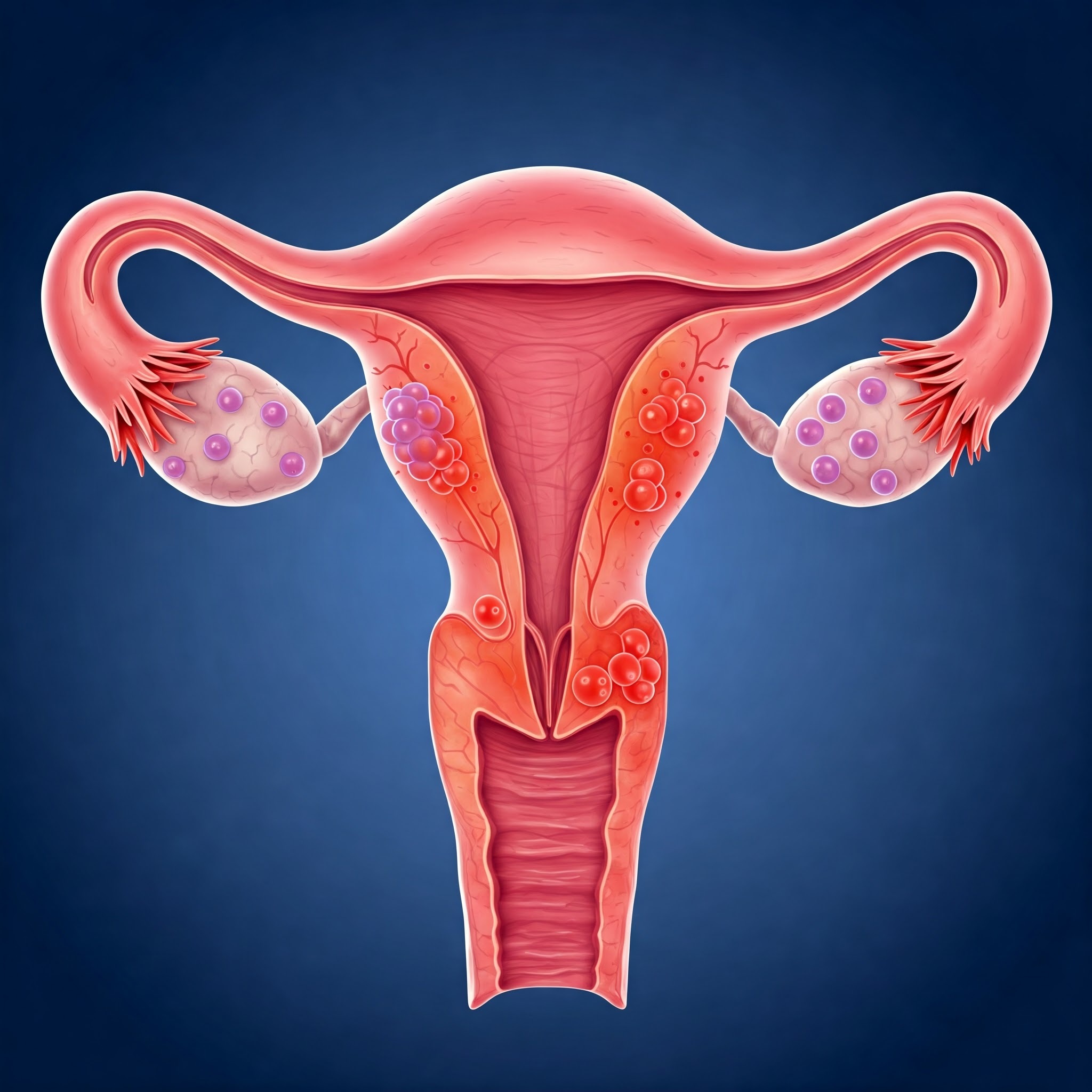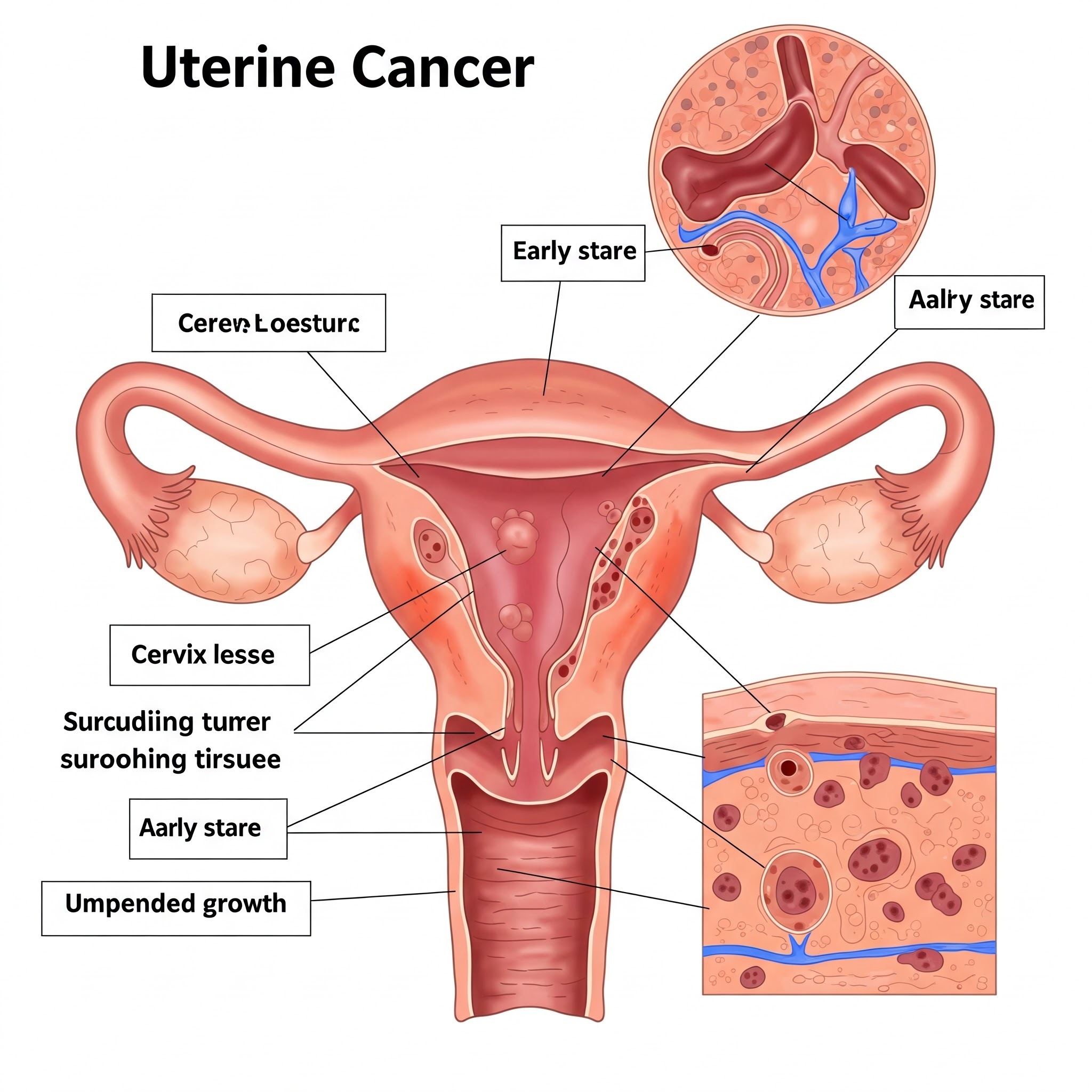Cancer of uterus
Protect your health with early uterine cancer detection
Expert guidance and comprehensive care for uterine health
Understanding the early signs of womb cancer, such as abnormal vaginal bleeding, pelvic pain, and unexplained weight loss, is essential for early detection. Our clinic offers advanced diagnostic services, including transvaginal ultrasounds, endometrial biopsies, and hysteroscopies, to accurately evaluate uterine health. Early diagnosis significantly enhances the uterus cancer survival rate, offering patients more effective treatment options
Our multidisciplinary team develops personalized treatment plans that address the specific needs of each patient. From minimally invasive surgeries like hysterectomies to chemotherapy, radiation, and targeted therapies, we employ the latest advancements in uterine cancer treatment. At Neo-Woman’s, we believe in compassionate, patient-centered care, empowering women with the knowledge and support they need to prioritize their health and well-being.


Neo-woman uterine cancer clinic provides comprehensive care for uterine health:
Our team of dedicated specialists is committed to supporting women through every stage of uterine cancer diagnosis, treatment, and recovery. We offer expert consultations, advanced diagnostic tools, and personalized care plans to address concerns related to uterine health. Recognizing uterus cancer symptoms, such as abnormal vaginal bleeding, pelvic pain, and unexplained weight loss, is essential for early detection. Our clinic employs state-of-the-art imaging and diagnostic techniques to provide accurate diagnosis and determine the best course of action.
We prioritize patient education, helping women understand the signs of womb cancer, its potential causes, and available treatment options. Our multidisciplinary team develops individualized care plans that consider uterine cancer stages, treatment options, and risk factors. At Neo-Woman’s, we are dedicated to providing compassionate care and empowering women to take proactive steps toward maintaining their uterine health.
- Tailored treatment pathways
No two patients face the same experience with uterine cancer, and our care team is committed to individualized treatment planning. We evaluate each patient’s diagnosis in detail—considering the type, grade, and progression of the cancer—to create a surgical plan that aligns with both medical needs and personal preferences.
Here are some of the check up and health screenings that you should get done:
- Pelvic Exam
- Pap Smear (Cervical Cancer Screening)
- Breast Exam
- Blood Pressure Measurement
- Cholesterol Screening
- Bone Density Scan (DXA)
- Blood Sugar Test (Glucose Screening)
- Thyroid Function Tests
- Blood Count (Complete Blood Count, CBC)
* The specific exams and screenings recommended can vary based on a woman’s age, family history, personal health history, and risk factors. It’s essential to discuss your individual healthcare needs and screening schedule with your healthcare provider.
- Minimally invasive options for better recovery
Whenever feasible, we opt for minimally invasive surgery in the treatment of uterine cancer. Techniques like laparoscopic and robot-assisted hysterectomies are commonly employed to remove the uterus and, when necessary, surrounding tissues. These advanced procedures involve smaller incisions, less pain, and quicker post-operative recovery, making them ideal for early to intermediate-stage cases.
- Comprehensive surgical approaches for advanced cases
For patients with more advanced uterine cancer, we perform complex surgeries that may involve the removal of the uterus, cervix, lymph nodes, and nearby tissues. Known as radical hysterectomies or staging surgeries, these procedures help ensure that the cancer is thoroughly addressed while guiding further treatment strategies like radiation or chemotherapy.
- Preserving fertility when possible
Although uterine cancer often occurs post-menopause, some younger patients may be diagnosed at an earlier stage. In such cases, and when clinically safe, we offer fertility-sparing options such as hormonal therapy in conjunction with conservative surgery. This allows some women to delay more aggressive procedures while preserving their reproductive potential.
- Integrated post-surgical support
Following surgery, our patients receive ongoing care tailored to their recovery and long-term health. This includes coordination with oncologists, dietitians, and rehabilitation specialists. Our team is also dedicated to monitoring for recurrence and managing symptoms to promote a strong quality of life beyond the operating room.

Frequently asked questions
What are the early symptoms of uterine cancer?
The most common early symptom of uterine cancer is abnormal vaginal bleeding, especially after menopause. Other symptoms include pelvic pain, pain during intercourse, and unusual vaginal discharge. If you notice persistent or unusual symptoms, consult a healthcare professional immediately, as early detection significantly improves treatment outcomes.
What causes uterine cancer?
Uterine cancer is often caused by hormonal imbalances, specifically excessive estrogen without enough progesterone. Other factors include obesity, diabetes, a family history of uterine cancer, and conditions like polycystic ovary syndrome (PCOS). Lifestyle factors, such as poor diet and lack of physical activity, can also contribute to the risk
How is uterine cancer diagnosed?
Uterine cancer is typically diagnosed through a combination of pelvic exams, transvaginal ultrasounds, endometrial biopsies, and hysteroscopies. If cancer is detected, additional imaging tests like CT scans or MRIs are used to determine the cancer’s stage and spread. Early diagnosis is key to effective treatment.
What are the treatment options for uterine cancer?
Treatment options for uterine cancer include surgery (such as a hysterectomy), radiation therapy, chemotherapy, hormone therapy, and targeted therapies. The treatment plan depends on the cancer’s stage, type, and the patient’s overall health. Advances in minimally invasive surgery have made recovery quicker and less painful
Can uterine cancer be prevented?
While not all cases are preventable, the risk of uterine cancer can be reduced by maintaining a healthy weight, staying physically active, and managing hormonal imbalances. Regular gynecological check-ups, especially for women with a family history of cancer, are crucial for early detection and prevention.

Service line
Our locations
Neo-woman clinic
Apte Road
1212, Apte Rd, opp. Centro Hotel, Shirole Road, Shivajinagar, Pune, Maharashtra 411004
Contact us at: 9423039292
Our locations
Neo-woman clinic
Hadapsar
Gandharva Empire, 3rd floor, Above Fab India, Raskar Chowk, Amanora Park, Hadapsar, Pune, Maharashtra 411036
Contact us at: 7030114488
Copyright © 2026 neo-Woman – all rights reserved.
:::| powered by dimakh consultants |:::